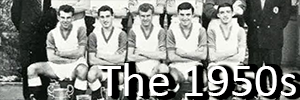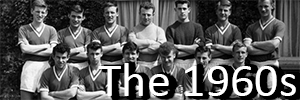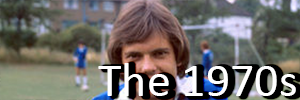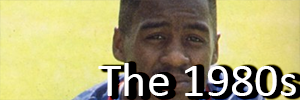As we get set to embark on a 63rd FA Youth Cup campaign, many people may not realise that Chelsea have a rather proud history in the competition. The Blues might well have won three of the last five iterations of the prestigious tournament and will be favourites to reach a fourth final in succession but, if you trace their roots back to the fledgling days of the cup in the early 1950s, you’ll discover there’s a rich tapestry of youth development at Stamford Bridge; one which has shaped the course of the club over many a generation.

Manchester United dominated the early days of the Football Association Youth Challenge Cup, claiming silverware in each of the first five years of its existence, but Chelsea were to enjoy their successes in the 50s too. Whilst Ted Drake was busy plotting first team glory, Dickie Foss’ youngsters began to make a name for themselves as early as the 1954-55 season, when they reached the Semi Finals before succumbing to the relentless Red Devils.
Les Allen’s twelve goals weren’t quite enough to get them over the line but a pair of all-time greats would emerge towards the end of the decade. Barry Bridges and Jimmy Greaves scored more than 200 goals combined for Chelsea’s first team and were a frighteningly prolific tandem in Foss’ youth team (Greaves had netted in excess of 100 goals the previous season) as the Blues reached the 1957-58 Final. They did so with remarkable attacking prowess, reaching double figures in ties against Grays Athletic, Woodford YC and Bexleyheath & Welling, whilst also handing out handsome victories over Southampton and Arsenal en route to meeting Wolverhampton Wanderers in the Final.
An emphatic 5-1 win at Stamford Bridge in front of almost 20,000 fans would surely have been enough to secure a maiden Youth Cup trophy but Wolves turned the tie on its head at Molineux on May Day of 1958; winning 6-1 and therefore 7-6 on aggregate, with Bridges describing goalkeeper Barry Smart as having had ‘a nightmare’. It also meant Bridges’ astounding haul of 24 goals in that year’s run counted for nought, but they wouldn’t have much longer to wait.
The 1959-60 campaign was a little less prolific, although West Thurrock United (10-0) and Ford United (11-0 after a 0-0 draw) may disagree, but a rock-solid team featuring a host of future CFC legends brushed aside Portsmouth, Aston Villa and Bristol City before finally getting over the line with a 5-2 aggregate victory over Preston North End in the final. A hat-trick from 18 year-old Bobby Tambling did the trick but not only did this team produce the club’s long-time leading goalscorer (until Frank Lampard passed him in 2013), but a core of Peter Bonetti, Terry Venables, Allan Harris and Bert Murray would later go on to forge wonderful reputations of their own in the adult game.

Success breeds success and so in 1960-61, the Blues would’ve been expected to go well in the defence of their hard-earned crown. Ipswich were humbled 7-0 as Gordon Bolland, Colin Shaw, Venables et al picked up where they had left off, whilst Shaw then netted seven against Fulham in a 9-0 thumping in Round Two.
Tottenham, Oxford and Swindon all felt the might of Foss’ exhilarating young squad, as did Arsenal as they fell to a pair of 2-0 defeats in the Semi Final. Stamford Bridge hosted the first leg of the Final in April 1961 where 6976 fans saw Bert Murray complete a hat-trick against Everton in a 4-1 win which would prove sufficient to withstand a 2-1 reverse at Goodison Park four days later and earn back-to-back Youth Cups. Bonetti and Tambling had already graduated to Drake’s first team but this crop did not want for future stars; Ron Harris joining brother Allan in becoming a youth team champion.
Aspirations of a three-peat were dashed by those dastardly Wolves in the Semi Finals of 61-62 but by then many of those who had played such a key part in the memorable victorious teams had become key figures in Tommy Docherty’s swashbuckling first team; ‘Docherty’s Diamonds’ bouncing back from relegation with a swagger and a confidence built by those who had previously excelled under Foss.
Dickie’s last hurrah came in 1965 when an 18 year-old Peter Osgood scored four goals before Arsenal ended their run in the last four. Chelsea’s longest-serving youth team coach would step aside a year later and it would be some time before any team could challenge the feats accomplished by his golden generation.

Youth Cup success wasn’t forthcoming in a largely memorable decade for the club as a whole but that needn’t have meant that the youth system wasn’t doing its job. Dave Sexton, Ron Suart and Eddie McCreadie blooded a slew of kids who caught the eye; Ray Wilkins, Steve Finnieston, Clive Walker, Steve Wicks, Tommy Langley and plenty more are still well-remembered to this day and many remain close to the work the current day academy is doing.
Some of those partook in decent showings between ’72 and ’75 – most notably a Semi Final appearance against Ipswich Town where Wilkins and company were edged out by a single goal over two legs – but with such a rapid progression from boys to men under McCreadie it wasn’t too surprising that early eliminations came under the stewardship of Ken Shellito (who would in turn step up to replace McCreadie) and Brian Eastick to close out the decade. Colin Pates, Mick Fillery, Peter Rhoades-Brown and Gary Chivers made first-team names for themselves but like those that went before them in the 70s, weren’t able to break the Youth Cup hoodoo.

First team frustrations on and off the pitch affected the entire club for large spells during the 1980s and the youth sector struggled for both cup success and for production to the first team. The late John Neal would go a long way to addressing the former with fantastic work in the transfer market and in terms of man management though, whilst Gwyn Williams emerged as a capable guiding hand for the younger generation.
The Welshman spent almost thirty years at Stamford Bridge before departing in 2006 and as the 80s went on his work began to pay off. Jason Cundy, Gareth Hall, Billy Dodds, Graham Stuart, David Lee, Frank Sinclair, Eddie Newton, Nathan Blake, Damien Matthew, Andy Myers and Craig Burley all graduated from the YTS scheme and flourished as pros. Many would later return to give back to the academy – Newton and Myers are currently key figures in Neil Bath’s setup – and all would go on to be given influential roles in Bobby Campbell’s first team.
It unfortunately rarely translated into Youth Cup success though, with more early exits and fleeting involvement each season. The less said about a 6-0 elimination at the hands of Tottenham Hotspur in 87-88 the better, but as a new era was about to engulf English football, Chelsea weren’t doing too badly all told.

The arrival of the FA Premier League changed everything, but the Blues remained committed to giving their best and brightest a fair chance to show what they could do. Neil Shipperley, Ian Pearce, Nick Colgan, Muzzy Izzet and Michael Duberry stood out in the early part of the decade but it was a familiar tale as far as the youth team’s fortunes on the pitch went. Mick McGiven, Dave Collyer, Graham Rix and Peter Nicholas all tried and failed to get further than the Fifth Round and it was under Rix that perhaps the lowest moment of all came in 1995.
A 2-2 draw at Basildon United was frustrating in the first place but a 1-0 defeat at home in the replay still brings back painful memories for the likes of Jody Morris and Neil Clement to this day. Rix’s ascent to the first team assistant manager role saw Ted Dale and then Jim Duffy take over the reigns and there was a marked improvement in all facets of the academy, as it had become by then following Howard Wilkinson’s charter for change in the English game.
A last eight showing in 1998 was promising not just for the goalscoring exploits of John Rattray and Sam Parkin but also for the potential of a pair of midfielders in the process of converting their roles into defence. Jon Harley’s first-team debut arrived one month after Blackburn had knocked them out of the Youth Cup whilst John Terry would have to wait until later that year before making the first of his now 600+ appearances as the club’s leading youth team product.
The changing face of English football and the ever-increasing interest in continental talent began to seep into the younger generation and that was reflected in the team’s make-up at the turn of the century. For every Carlton Cole and Leon Knight there was a Sam Dalla Bona and a Luca Percassi, and eliminations at the hands of Newcastle and Crewe showed there was still a long way to go if they were to ever get their hands on the FA Youth Cup again.

That looked further away than ever in the winter of 2000 as Neil Mellor rampaged through the Bridge, netting five for a talented Liverpool team that eviscerated Duffy’s team 7-1. Several of those on the losing side that night would be in for an altogether more interesting proposition a couple of years later when opting in for the controversial trip to Tel-Aviv for a UEFA Cup match at Hapoel, but they were well beaten here.
A 4-0 hiding at Blackburn twelve months later would prove to be Duffy’s last go in the Youth Cup before Steve Clarke started out on a coaching career that would take him to Premier League management. It wasn’t easy for the dependable Scottish full-back after 400 appearances as a player and with financial concerns once again looming large over the club, everyone was affected. The last FAYC match of the Ken Bates era saw Luke Moore strike twice in front of 250 hardy souls at a cold Stamford Bridge to put this Chelsea team to the sword:
Yves Makabu-Makalambay, Dean Smith, Ed Brand ©, Adrian Pettigrew, Ben Hudell, Anthony Grant, Jimmy Smith, Danny Hollands, Phil Youngshusband, James Simmonds, Michele Gallaccio.
The next ten years would be unlike anything ever witnessed not just at Chelsea but in football at large and although many of that team have had respectable careers (whilst Brand and Simmonds are both back at the academy as coaches), the required standard would immediately become much higher as Roman Abramovich moved in and grand designs were implemented to put Chelsea at the very top of the game at every possible level.
As noted in a piece on this blog recently, a radical and detailed overhaul of all that had gone before it at Chelsea’s academy was implemented within a year of Abramovich taking over. The 2004-05 elimination to Colchester United came too early to really feel the effects of the new regime but a year later a squad high on the first wave of investment saw off Norwich City before falling to Brighton.
Scott Sinclair, Ryan Bertrand, Harry Worley and others were acquired from around the country to join bright club-grown youngsters Jack Cork, Liam Bridcutt and Sam Hutchinson, whilst before very long the net was cast wider afield and in came Miroslav Stoch, Sergio Tejera, Ben Sahar and many more from Europe. Their first taste of the competition was ended by eventual winners Liverpool in 2006-07 but the wheels were firmly in motion.
Sprinkle in the delights of Gael Kakuta, Jeffrey Bruma and Patrick van Aanholt a year later and Chelsea finally returned to the FA Youth Cup Final for the first time in some forty years. It proved just too big a task for them to go on and win it though as a Daniel Sturridge goal at Stamford Bridge and a strong team showing at the City of Manchester Stadium allowed Manchester City to win their second cup.
It was nonetheless a key milestone in the way the academy was heading. It reignited widespread interest in the youth’s team’s fortunes amongst supporters, with upwards of 30,000 people attending the two legs of the final combined. Paul Clement, a former PE teacher who had made his way through the junior ranks, had his team playing exciting, attacking football and was developing his own career into one that has taken him to Real Madrid and the European Cup as Carlo Ancelotti’s assistant.
It was somewhat deflating then when a third exit to Liverpool inside ten years happened at Anfield the following season, but Chelsea struggled for form and fitness that night and have rarely looked back since. Only five of the next thirty-eight youth cup outings would end in defeat, and only three of those would matter.

Although we really should be keeping strictly to the decades theme used throughout, Chelsea’s era of FA Youth Cup dominance began in the final decade of the 2000s when, under the tutelage of Dermot Drummy, they were simply unstoppable. It took a late Conor Clifford piledriver to eventually see off Aston Villa in the Final but this was a team that has spawned full internationals, top-flight regulars and reliable professionals everywhere you look. Bruma marshalled the defence superbly and weighed in with three goals. Turkish winger Gökhan Töre dazzled on the wings and Marko Mitrovic provided the goals in attack. Schoolboy schemer Josh McEachran offered more than a glimpse of his undoubted potential and Clifford capped it off by scoring the decisive goal his leadership had both craved and deserved.
After fifty years the Youth Cup was back in SW6 but could it stay there? All was going swimmingly in ’10-’11 as another Under-16 in Nathaniel Chalobah stole the show with four goals from a largely defensive role as Sunderland, Arsenal, Barnsley and Watford were seen off before a titanic last four clash with Manchester United. There they came unstuck against a team that may well eventually go down as one of the very best to ever take to an FAYC field. Paul Pogba, Ravel Morrison, Will and Michael Keane, Tom Lawrence, Tyler Blackett, Mats Daehli, Ryan Tunnicliffe. The list could go on and Pogba, now amongst the world’s midfield elite, wasn’t even the star of their particular show.
Drummy moved up to handle Under-21 duties in the months that followed with Adi Viveash replacing him on Under-18 duty and it’s a remarkable feat that in three years at the helm the former Swindon centre-back has never failed to lead his team to the Final. After making it that far just three times in almost half a century, Chelsea were now expecting that at bare minimum.
The cardiac kids of the 2012-13 success were revered for their genuine defiance of situations in which it looked for all the world as if their bid for glory was dead. A penalty shootout win at Norwich kicked things off and Lewis Baker’s supreme, ball-juggling confidence as he prepared to take the winning kick was synonymous with the life this charmed bunch would go on to lead. Chalobah’s 94th minute equaliser at home to West Ham less than a minute after the Hammers had stolen ahead gave way to another shootout triumph but the best was yet to come.
Facing a 3-0 half-time deficit at Nottingham Forest, a premature exit seemed certain. Not for this team though, as Lucas Piazon, Islam Feruz twice and then Alex Kiwomya scored in a dramatic and memorable fightback. ‘Never in doubt’ was the refrain from sections of the Chelsea in attendance at the City Ground, and from that moment on it scarcely was.
A chance for revenge against Manchester United in the Semis was too good to turn down. Feruz and Amin Affane did the heavy lifting in a 2-1 win at Old Trafford whilst Piazon’s equaliser back at home was enough to advance to meet Blackburn in the Final. Chalobah, Baker and two more from Feruz brough the trophy home once again.
Retaining it, however, still proved elusive. The team had now morphed into a very English, very home-grown one with twelve of the sixteen named for the Final against Norwich eligible to play for England, but despite being by far and away the most impressive outfit in the competition and finally getting rid of Liverpool after so many disappointments against them, they tripped at the final hurdle.
Viveash’s boys dominated both legs against the Canaries but a pair of penalties conceded by Alex Davey in each match gave Neil Adams’ team crucial advantages which they refused to give up. The combined attendances of the two hard-fought affairs approached 40,000 but it was former Chelsea schoolboy Cameron McGeehan who lifted the silver at Stamford Bridge, not long-time team-mate and friend Lewis Baker.
Baker handed the captaincy to Ruben Loftus-Cheek upon graduating the youth team ranks and although there were moments where it appeared lost, a third FA Youth Cup in five years now sits in the burgeoning trophy case at Cobham. Fulham led 3-2 after 90 minutes of the Final and 6-4 on aggregate with fifteen minutes left at Stamford Bridge but, as usual, Chelsea didn’t know when they were beaten.
Isak Ssewankambo, a Swedish defender or midfielder now playing regularly for NAC Breda, evoked memories of Clifford four years prior with a rapier of an effort that flew into the bottom corner to bring hope. Charlie Colkett, a technician of the highest order and at the club since the age of 12, then laid on two late, late goals for Dominic Solanke, and the lad who has been Chelsea since the age of seven made it an even twenty for the season in blue by breaking Fulham’s hearts at the death to claim a 7-6 aggregate win.
Over the years we really have seen everything from Chelsea Football Club in the FA Youth Cup. The club’s leading appearance makers and goalscorers have emerged as fresh-faced teenagers on the road to the top whilst scores of others have gone all the way through the game and returned to where it all started to contribute to the next generation. In the last ten years the landscape has been altered inexorably and Chelsea do not possess the foremost youth in England, but one of the very best in the world on the pitch if not in terms of production just yet.
The 63rd iteration of this storied competition began many months ago but for Chelsea it kicks off next Tuesday evening at Elland Road, home of Leeds United. The match will be shown live on Chelsea TV and if the past has taught us nothing else, it’s that the youth cup is not to be missed.
(All photography copyright the respective rights holders, notably Chelsea FC. A huge thank you also to wallysorchard for his painstaking research of Chelsea’s FA Youth Cup history and willingess to share the information, all of which can be found at http://www.thechels.info/wiki/FA_Youth_Cup)
